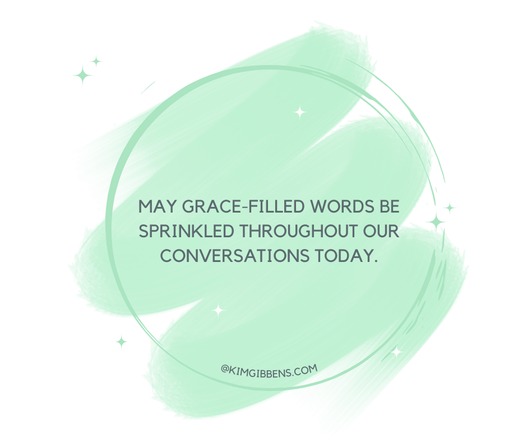 Let no corrupting talk come out of your mouths, but only such as is good for building up, as fits the occasion, that it may give grace to those who hear. Ephesians 4:29 ESV "You're a dumb *#@.” “Shut up.” “What the #@*k?" "Do you have to be so stupid?" Not so kind words swirl in the air of the hallways of high school like dust caught in a breeze. Teaching in high school is not easy. Being in high school is worse. Corrupting talk filled with bitterness, wrath, anger, clamor and slander flows from teenage mouths as freely as water from a spigot. Words and tones jab and poke at all who dare to come near them. Feelings are hurt and hearts are damaged by the poisoned barbs that rain daily from the sky. Grace, empathy, and forgiveness are anomalies in realm of high school. It's easy as an adult to pass judgment on the teens that surround me daily. I hear the mean words and flinch when I see the daggers hit their mark. I grieve for those who are torn down by their peers. I work to build community and protect the vulnerable in my classroom, but teenagers are masters at sniping at each other. Shot for shot. Jab for jab. So much energy is wasted on tearing each other down instead of building each other up. But, am I really that much different? How many of my conversations are negative in nature and injurious to the character or reputation of someone else? Whose feelings have I hurt being witty at their expense? Teenagers aren't the only ones who can be mean and thoughtless with their words. Adult women (and men) have that tendency too. Paul writes in Ephesians 4:29 "Let no corrupting talk come out of your mouths, but only such as is good for building up as fits the occasion, that it may give grace to those who hear." Wow. These are hard words for sarcastic girls like me. I like landing a good witty jab from time to time. But, Paul is telling me to stop punching. To stop using my words against others in order to make myself look good. Instead, I am to use my words to encourage, edify, and build others up. Corrupting talk is destructive. Its corrosive nature eats away at relationships and people weakening them to the point of destruction. Grace-filled talk is nurturing and life giving. It builds relationships into strong safe harbors by offering hope, encouragement, and forgiveness. Grace carves out a safe place for others to grow and blossom. Paul is telling us we need to make an intentional effort to choose our words wisely and use only the ones that benefit others. So next time we are gathered in the midst of friends, family or co-workers, instead of sniping at someone with angry word bullets, let’s launch mortars that spread kindness, tenderness and forgiveness instead. Heavenly Father, words are hard. It is hard to control them, especially when we are hurt or angry. I want my words to encourage and not discourage others. Guard my mouth. Keep the mean words inside. May grace-filled words be sprinkled throughout my conversations today. Amen
0 Comments
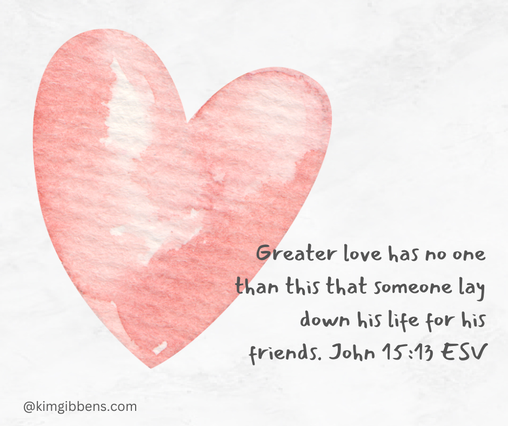 Who Would You Die For? Greater love has no one than this that someone lay down his life for his friends. John 15:13 ESV Know this, my beloved brothers: let every person be quick to hear, slow to speak, slow to anger; for the anger of man does not produce the righteousness of God. Therefore put away all filthiness and rampant wickedness and receive with meekness the implanted word, which is able to save your souls. But be doers of the word, and not hearers only, deceiving yourselves. James 1:19-22 ESV I wrote the following piece six years ago on February 15, 2018, the day after the Parkland High School shooting in Florida. Seventeen people (students and staff) were killed. Seventeen were wounded. Most of the students were freshmen. As Valentine's Day has once again come and gone, I wanted to post this once again. I hope you will listen. I couldn’t remove the cloak of weariness that was draped across my shoulders. The closer I got to home, the heavier it got. The weariness not only lay across my back, it pulled at my eyes and weighed down my head. It had been a very long time since I was this tired. Yesterday our campus was filled with balloons, flowers, stuffed animals, and chocolate. Today it was different. Fear, anxiety, and sadness swirled around the halls and classrooms like trash twisting and twirling in the wind. What a difference a few hours could make. Our students left school Wednesday with Valentine’s Day paraphernalia and plans on their minds and came back on Thursday morning wondering what the future would hold. Even now as I try to write this, I struggle to stay focused. You see I spent most of Thursday talking to teenagers about what we should do if an active shooter makes it up the stairwell, onto our hall, and into our classroom. Do we hide? Do we run? Do we fight? Their responses ranged from James Bond movie heroics to truly terrified “I don’t want to die” testimonies. I sat and listened. Sometimes directing the conversation down a more productive path, but most of the time just listening trying to “hear” the hidden true emotions behind the words being said. When it was all said and done, I couldn’t give them a perfect answer for what to do if we were ever faced with the horror the students in Parkland, Florida faced, but I could give them the reassurance that we would do whatever it took to survive. The blue-eyed warrior princess in the back calmly gave practical defensive plans for securing the door. The gregarious good-looking soccer player volunteered to put on the Spartan armor in the back of the room and “take the guy out” to which his friend replied, “No you won’t. You will stand there and scream like a girl.” Laughter and fear mingled together as we worked together to sort out the tangled emotions we all felt and reassure each other we would be okay. “Mrs. Gibbens, can I ask you a personal question?” a student asked as we began to transition to the tasks of school work. I motioned for him to come closer to me. “Would you take one for us?” “What do you mean?” “A bullet. Would you take one for us?” “Yes, I think I would.” “Really?” “Yes. I can’t be sure what I would do at that moment, but I think I would.” And I meant it. I’m not sure I would throw my body in front of a bullet for them, but I believe I would do what I could to see that they were safe. I would do my best to get them out of harm’s way. Why did I write all this? I am not totally sure, but I know in my heart that the best thing I could do yesterday was to listen to my kids, to not be quick to give them answers, to not do all the talking, but to give them a chance to speak. My kids yesterday needed to talk and they needed someone to listen. I wrote all this because James 1:19 says we need to be quick to hear. We need to listen to those around us. We need to not only listen to what they are saying, but to what they are not saying as well. We need to listen to hear the emotions behind the words. Listening takes work. Listening takes time. Listening takes setting our agendas aside to focus on what the other person is saying. Listening is exhausting, but listening changes things. Listening sets the stage that allows our words to have meaning and relevance. Listening validates the feelings of those around us. Listening tells others that they are seen and that they are important. Besides, in John 15:13 Jesus commands to his disciples to love each other, “Greater love has no one than this that someone lay down his life for his friends.” It’s easy to quickly assume Jesus means to literally die for each other (and sometimes it might) because that is what Jesus was about to do. However, I think there is a deeper message here. Laying down our lives for each other means sacrificing our daily agendas and making time for others. It means taking time to listen to them. One of the hardest things to do in life is to set aside our selfishness and seek to serve others, especially when it is inconvenient. When we have a thousand things to do, it’s hard to stop, put them down, and sit still and listen. However, in those moments, that is exactly what is needed. Offering our presence is one away to lay down our life for others. Being present is what Jesus calls us to do. Jesus calls us to be in tune and aware of the needs around us. He calls us to follow the prompting of the Holy Spirit to lay aside “us” to love the ones around us in the best way possible. Listening to my students that day was the best lesson I didn’t plan. The Holy Spirit prompted me on that day six years ago to set aside the academics that were planned and listen instead. My kid were asking me if I would physically die for them that day, but I believe listening to them was a small way I laid down my life for them. I might never have to die for someone, but I am called daily to make sacrifices for others. You see, what I am learning is that setting aside our agendas, sacrificing our time, and maybe even our money to love someone well requires us to lay down ourselves and “die” a little for our friends. Stay dressed for action and keep your lamps burning, and be like men who are waiting for their master to come from the wedding feast, that they may open the door to him at once when he comes and knocks. Luke 12:35-36 ESV I would love to say that I am ready for Christmas. But, I am not. Sunday I pulled my tree out of its box, snapped its three pieces together, and plugged it in. The white lights flickered and then began to twinkle. A festive glow glimmered throughout the room. I would love to say I grabbed one of the multitude of boxes of Christmas ornaments and went to town adorning my newly assembled tree. But, I did not. Instead, I grabbed my laptop and began grading papers and making lesson plans. For now, the tree would have to wait for another day, work was the pressing need of the moment. I would love to say that this scenario is a new one for me. But, it is not. The past few Christmases in our house have been sideswiped by unexpected, difficult, and time-demanding circumstances. Individually they don’t sound like much, but like compounding credit card interest they totaled a debt that completely depleted my emotional bank account. Honestly, I have been worn out. As a teacher by the time the semester ends at school (our last day was two days before Christmas Eve), I am too tired to take on the tasks of Christmas. The sad thing is, by the time I have been home for a few days, have rested a little, and am ready to prepare for Christmas, it’s over. It’s frustrating. For the past several years, my energy levels haven’t matched my seasonal celebration plans. I thought about my lack of Christmas ready as I read Luke 12: 35-36. I realized that I would not have been the ready- at- the door guy waiting for the groom to return. I would have been the scrounging- around guy trying to finish up a few loose ends before the master’s big arrival. The pressing needs of the urgent would have distracted me from what was important. My season of weariness is teaching me that there really isn’t a best time (or enough time) for all the things we desire to do. Life can be exhausting. Work. Children. Home. Aging-Parents. Hobbies. Spouses. All of these things tug at our time. Like unwinding ball of string, each one pulls a strand of time (and energy) away from us until all that’s left are a few straggling strands of seconds. In 2014, my word for the year was intentional. I chose it because I wanted to move beyond having good intentions; I wanted to be more intentional about my relationships and actions. I didn’t want important things to sneak up on me or worse yet pass me by leaving me unready for them. I wanted to manage my time instead of having time manage me. It is now 2023 and I am still struggling with being intentional. Unlike the men in Luke 12, I have a propensity to let the urgent crowd out the important. If we look closely, we can find key to the men being ready; they were intentional about it. They stayed dressed. They kept their candles lit. They listened intently at the door for the knock. Oh, how I want to be intentional about being ready for my Master. Unlike my lack of Christmas readiness, I don’t want the worries, stresses, obligations and hurts of my days to keep me from listening for my Lord. I don’t want to let weariness keep me from seeing Him around me. I want Him to fill all my moments. I want continuous conversations with Him to dance and flicker like Christmas lights on a tree. I want my desire for Him to crowd out the desires for myself. I want the importance of His presence to diminish the distractions that pull at me. Like the men at the door, may we all be ready to open our eyes, hearts, minds and hands when our Savior knocks. 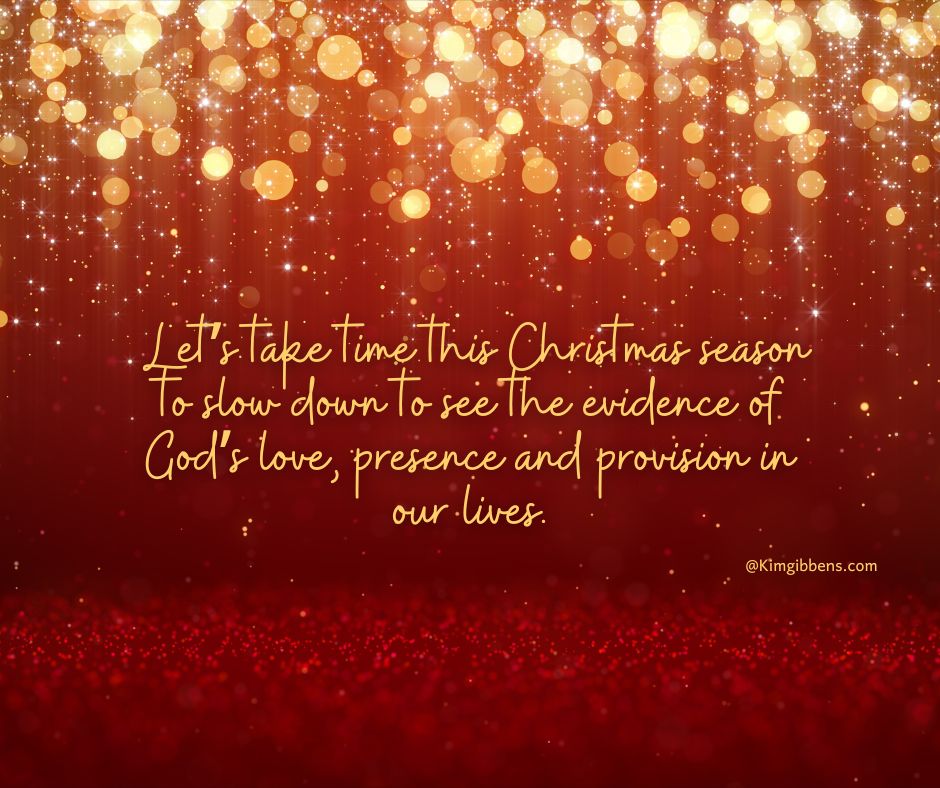 That you may have certainty concerning the things you have been taught. Luke 1:4 If we are honest, I think all of us have had moments when we have wrestled with our faith. Like Jacob, we have struggled through the night with doubts about God’s love, presence or provision. We may have wondered “why me” more than we care to admit. Maybe, hardships and disillusionment have exhausted us causing us to become worn out and weary desperately seeking a tangible touch from God. Likewise, the people of God had been waiting a long time for the promised Messiah. After ten generations of suffering, hardships, persecution, disappointments, and most of all silence, they had to be tired. Maybe even hopeless. I imagine in the quiet moments in the dark, doubts must have swirled around them like dust caught in the wind. Questions probably bubbled to the surface about what they had been taught for generations. Rising and falling like labored breath. True? Not true? Cares? Doesn’t care? Coming? Not coming? Doubts are like that. They rise and fall with the tide of our circumstances. The longer the hardships last, the deeper the doubts grow. But, in the midst of the darkness, in the deepest part of our darkest doubt, God is there. Waiting. Listening. Holding. Loving. God never discounts our doubts nor dismisses them. Instead, God wrangles our doubts, untangles them, ties them up, and sets us free. He uses our struggles of faith to build a stronger faith within us. He loves us enough to allow us to wrestle until Truth becomes our own. One of the great patriarchs of our faith wrestled with his faith as well. The story of Jacob wrestling all night with the Lord is outlined in the book of Genesis and stands as an example for all of us. In the end, Jacob walked away from his midnight tussle of trust a new person. He walked away with a limp, a blessing and a new name. His encountered changed him. He started with doubts but left convinced of his faith and committed to his God. We can experience the same thing too. Friends, we all struggle at times to understand the hardships happening around us. In Isaiah 55:8-9 God states, “For my thoughts are not your, thoughts, neither are your ways my ways, declares the Lord. For as the heavens are higher than the earth, so are my ways higher than your ways and my thoughts than your thoughts” (ESV). The comfort I see in these verses is hearing that I don’t have to know it all. God already knows we don’t “get it”. Therefore, we don’t have to be ashamed to question, test, and rethink our faith. He knows we struggle. He can handle our questions, doubts, fears and anger. Besides, He knows all of it already. However, the one truth we need to cling to, even if everything else is topsy-turvy, is that God loves us. God loves us so much “…that he gave his only Son, what whoever believes in him should not perish but have eternal life” John 3:16 ESV. You can be unsettled about many things but Jesus is the one thing upon which you can rest assured. As we enter this Christmas season and start to decorate, let’s take time to slow down and see the evidence of God’s love, presence and provision in our lives. Let’s let Luke’s words in chapter one verse four, “that you may have certainty concerning the things you have been taught” inspire us to use all of the Christmas festivities surrounding us to strengthen our faith. Faith in the fact that Jesus is the ultimate evidence of God’s love, presence and provision in our lives. 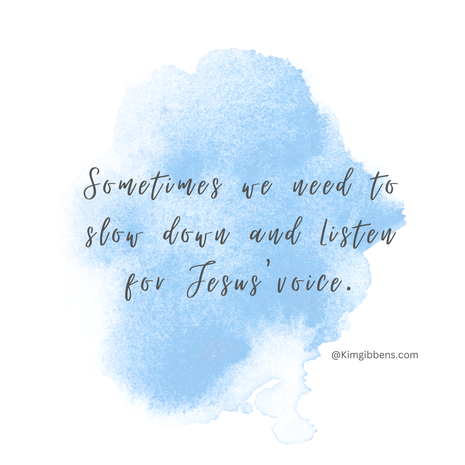 Stay dressed for action and keep your lamps burning, and be like men who are waiting for their master to come home from the wedding feast, so that they may open the door to him at once when he comes and knocks. Luke 12:35-36 ESV When I was little, I was so excited when I was finally allowed to stay up until midnight on New Year’s Eve. Our family popped popcorn, assembled a 1000- piece jigsaw puzzle, and started a game of Risk. On the TV, Dick Clark counted down the hours until the magic moment of the New Year’s arrival. Inevitably, I would fall asleep long before the clock chimed twelve. I would wake up the next morning in my bed with disappointment washing over me wondering what I had missed. No matter how hard I tried, I just couldn’t make it until midnight. Inescapably, January 1 arrived without me. My inability to stay awake consistently left me feeling disappointed at missing the exact moment the New Year arrived. I thought about my New Year’s Eve experience recently as I was reading Luke 12. Tucked inside this chapter is a little verse about missing out on a unique and wonderful experience on account of not being able to wait. Slipped in amongst teachings about rich fools and anxiousness is a short parable about the reward found in waiting. Using lamps, servants, and weddings, Jesus slides a simple story of a profound blessing encountered through faithful waiting. Much like our tradition of staying up to usher in the New Year, Jewish weddings contained the tradition of staying up to usher the bride and groom into their new home. In Jewish culture, the groom’s house was prepared and readied for the couple’s arrival long before the wedding day. After the wedding ceremony and celebration feast, the groom would bring his bride home to the place he had prepared for her. The servants were instructed to be ready to open the door as soon as he knocked. Not knowing how long the feast would last or when the couple would arrive, the servants were to be ready to let them in no matter what. That was their job—wait, watch, and open the door when the master knocked. The beauty of the waiting described in verse 36 is found in verse 37, “Blessed are those servants whom the master finds awake when he comes. Truly, I say to you, he will dress himself for service and have them recline at table, and he will come and serve them” Luke 12:37 ESV. By waiting for the groom to arrive, the servants were then treated to the groom himself serving them leftovers from the wedding feast. Picture it. The groom tells them to sit down. He brings in the lamb, fruit and wine setting it on the table in front of them. He then pulls up a chair, instructs them to eat up, and begins describing the evening’s festivities in detail. His face lights up as he talks about his bride. He laughs as he recounts the dancing and drinking. Joy fills the room. The servants are blessed in this moment with the master because they stayed alert and opened the door when he knocked. It’s easy to think about these verses solely in terms of Christ’s future return, but I see another lesson here. I see Jesus calling us to open the door to daily fellowship with him. You see, the servants would have missed out on this moment with their master if they weren’t listening for his knock at the door. Likewise, if we are not careful we can miss Jesus’ knock on the door in our own lives and miss out on the moments he wants to spend with us (Revelation 3:20). I missed many New Year’s celebrations because I fell asleep. In the same way, I don’t want to miss moments with my Savior because I didn’t hear Him knocking. I don’t know about you, but my life is busy and filled with distractions (family, work, social media, worries, household chores and to do lists). If I am not careful, the cacophony of noise around me can drown out the knock at my heart’s door. Turning down the noise and listening for my Savior’s knock takes intentionality. Just like the servants in the parable had to tend their wicks to keep their lamps burning, I have to purposefully make time to slow down and pay attention in order to hear Christ’s invitation to come and sit with Him. For me, His knock may come while I am outside running, walking, or sitting. It might be while I am driving. Other times His summoning can come when I am home alone and quiet. But, the key for me is to recognize His knock, slow my thoughts, let Him in, and listen to what He wants to say in my life at that moment. Personally, I don’t want to miss the experience of His companionship like I missed out on celebrating New Year’s so long ago. I want to carve out time in my day to be still in order to listen and watch for the sound of Christ’s voice in my life. Maybe you feel like Jesus hasn’t stopped by your house in a while. Maybe, you can’t remember the last time you enjoyed His companionship. The truth is, He is still outside your heart’s door waiting to come in. I challenge you today to turn down the noise around you and listen for His tap on your heart. When you hear it, open the door, let Him in, pause, and enjoy a precious moment with your Savior. 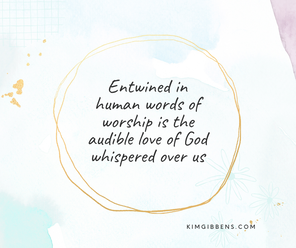 Let everything that has breath praise the Lord! Praise the Lord! Psalm 150:6 I stood on the back porch swaying back and forth. His little body began to relax. The fifteen-month-old was stubborn. Determined not to sleep. The wind rustled the leaves in the trees. His head lifted off my shoulder. I whispered in his ear, “Do you hear that? God is saying he loves you. Listen. Do you hear Him? ‘I love you Abraham.’” The wind continued its rustle and I continued to whisper words of love in the ear of my sleepy grandson. As I stood wooing Abe to sleep, God was wooing me to praise. The whisper of the breeze, the twitters of the birds, and the sway of the leaves all resonated with praise to the One who created them. Creation by its very existence gives praise to God. The quiet flutters of a butterfly, the loud crashes of ocean waves, the brilliant hues of a sunset, even the translucence colors of a rainbow exalt the One who made them. Nature doesn’t need to be reminded to praise its creator. By its very existence, creation lauds the One who made it. Not only does nature worship the One who created it, it calls us back to our Creator as well. As I stood outside cradling my grandson, God echoed back to me what I whispered in Abe’s ear, “I love you.” Within every squawk, rustle, swoosh and twerp was a reminder of God’s never-ending love for me. By simply being, nature reminded me of God’s endless love. Psalm 150:6 reminds us that everything that has breath is to praise the Lord. My moments outside taught me two things about praise. One, praise brings glory to the One who deserves it. Nature stands as an altar to the Lord. The sights, the sounds, the smells all proclaim the glory of God. Second, continual praise gives voice to God’s love. Within the rush of the wind I could hear God saying, “I love you.” Entwined in human words of worship is the audible love of God whispered over us. Simply put, by praising the Lord we give glory to God and communicate his love to others. By swaying in the breeze, the trees in my yard whispered God’s love to me. Likewise, when I praise God I give voice to His love for others. If I could I would take you outside and stand beside you, telling you to hear God’s words of love being whispered over you. Sweet friends, our praise might be quiet like a breezy lullaby or loud like thundering cymbals. It doesn’t matter. We are called to praise. So, let’s take a page from the natural world outside and praise the Lord. Then listen for the words of His love for us echoing back. 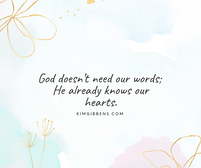 For God alone my soul waits in silence; from him comes my salvation. He alone is my rock and my salvation, my fortress; I shall not be greatly shaken. Psalm 62:1-2 My hands pressed down on the side of the bed as I folded myself onto my knees. I lowered my face to my hands and started to pray, “Dear Heavenly Father…” I stopped. I had nothing else to say. The words were missing. Instead of offering empty words of rote religion, I stopped. A heavy sigh expanded in my chest and blew past my lips pulling with it the words, “I got nothing. I’m empty.” My head dropped and I pressed my cheek into the pinstriped covered mattress. I laid there--silent before the Lord. Not a word was spoken. A few years ago I started getting up early in order to spend time with the Lord before going to work. Teaching was taxing and a few minutes in prayer before I entered the chaos of high school helped me to align myself to God’s mission for the day and to set aside my stress, anxiety, and frustration. My usual morning prayers brought a litany of “help me, guide me, show me or teach me” requests. But on the morning of my silence, I had no words. My heart was heavy, but I didn’t know what to say. Trusting the Holy Spirit would intercede for me (Romans 8:26-27), I laid my head down in the lap of my Lord like a child seeking comfort from a parent. I sat in silence with my best friend and greatest advocate. Part of my journey into a more authentic faith has involved developing honesty in my prayers. What began as conversations with God while running in college, has grown into an ongoing daily dialogue with the Lord (I have expressed some pretty rotten things and said some not so nice words). Through it all, I am learning talk to God as if He is my closest friend. And, just like with a best friend, some conversations call for silence. In Psalm 62:1-2, David expresses a moment of surrendered silence before God, a moment of saying “I got nothing. I am empty.” In other words, David had fully surrendered his place of struggle to the Lord. If you look closely, David is not asking for anything (no help me), he is not afraid (no protect me), and he is not desperate (no save me). He has taken a posture of reliance and total dependence (I trust you). David was focused on God alone. He had reached a point in his relationship with the Lord where he could claim that all he needed was God. What about us? What about you? Have you been in a season of struggle? Heartbreak or hardship? Have you said all the things you need to say and now are speechless before the Lord? Has your mind run out of scenarios of ways to solve your problems? Have you reached that moment of “I got nothing” “I’m empty”? Friend, that’s exactly where God wants you and me. It’s in these moments I believe God is calling us into a deeper walk with Him. It’s when we are at the true end of ourselves that we fully trust Him. Maybe God is calling you to a quiet conversation today. Maybe He is beckoning you to lay your head in his lap allowing his comforting hand to stroke your hair like a parent with an anxious child. Maybe your heart is so tangled you don’t have the words to sort it all out. That’s okay. Sit there. Let the Holy Spirit untangle it for you. Just go. Meet with Him. Sweet friends, God doesn’t need our words. You see, He already knows our hearts. He just wants us to bring it all to Him and trust Him to take care of us-- with or without words. 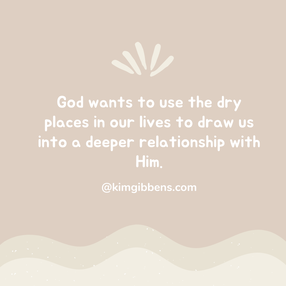 And the Lord will guide you continually and satisfy your desire in scorched places and make your bones strong; and you shall be like a watered garden, like a spring of water whose waters do not fail. Isaiah 58:11 Midwestern family members made a trip to my hometown in the desert, and needless to say they were not impressed. The lack of lush green lawns and expansive trees left them searching for something good to say about it. Similarly, my youngest son returning from a mission trip a few years ago to my home state stated, “I didn’t know there were so many shades of brown.” Having spent most of his life in Florida, the desert did not yield the same color palate as the tropics. To the untrained eye, the desert is a very barren and desolate place. The lack of water leaves the vegetation looking scrawny and ragged. Softness is missing in the desert. Raw sharp edges adorn jagged plants. The landscape is rough and hard. But to the one who has grown up there, this dry barren place holds a special kind of beauty. Life is tucked beneath the rocks and sand, often lingering in the shade hiding from the sun waiting for the summer rains to come. And when the rains come, the desert blooms. In Chapter 58 of Isaiah, the people were doing all the right things, but they couldn’t find God. Their prayers were going unanswered. Life lacked joy and fulfillment. Just like my family members, the Israelites were looking for green plants and signs of life, but everything around them was scorched and dry. They were asking: “Why is the desert so brown? Why isn’t God present?” God’s response in Isaiah 58 is similar to what the desert dweller says to the disappointed visitor: “It’s brown because it lacks water. You can’t see the life because you are looking for it in the wrong places.” God’s people weren’t experiencing God’s presence because they were living spiritually without Him. Sure, they were jumping through all the right spiritual hoops: fasting, praying, attending church, singing praise and worship songs, but their hearts were far from God. They were keeping up a good spiritual appearance, but the reality was in their day-to-today living they were oppressing their workforce, pointing accusatory fingers at each other, inflicting verbal wounds on those who disagreed with them, and withholding their generosity to those in need. In other words, their lives were marked by hypocrisy. What they said they believed and what they lived did not match. God gives them directions for finding His presence in the scorched places. He offers a promise for providing water in the dry desert: realize what they are doing, repent, and seek Him. In order to see the beauty in the land around them, in order for the rain to come and cause their spiritual desert to bloom, the Israelites needed to repent. They needed to stop doing the shallow worship thing and start doing the authentic faith thing. God was calling them away from religion and back into a relationship with Him. I believe God is making the same appeal to us today. Many of us are experiencing scorched places. Our hearts are dry and our souls are weary. We look around and all we see are shades of brown. Like the desert dweller to the visitor, God is pointing out where to look for His presence: “Look see, it’s in the sunset. Look over there, it’s tucked in the pages of my Word. Look closely, I’m behind the eyes of your friend.” God wants to use the dry places in our lives to lead us into a deeper relationship with Him. A few years ago, I returned to the desert for my mom’s funeral. The winter had been cold and rainy. Snow had touched the mountains. From the window of my rental car, I was struck by the beauty around me. The desert was so green. Plants were blooming. White and pink blossoms capped the cacti. Yellow flowers filled the Palo Verde trees. The dirt didn’t seem so brown. Water had washed across the desert. In the same way winter water brought new life to the desert, God promises to bring spiritual life back to us. Isaiah 58:11 reveals that the call back to a relationship with God comes with a promise. A promise of guidance. A promise of fulfillment. A promise of strength. A promise of nourishment. A promise of flourishing. A promise of purpose. When we sincerely seek Him, God promises to water the dry and barren places in our soul. Sweet friends, if you find yourself in a spiritual desert (or real one), don’t let the shades of brown discourage you. Life and beauty still reside in dry places; you have to look for them in the right spots. God is there even when you can’t see Him. 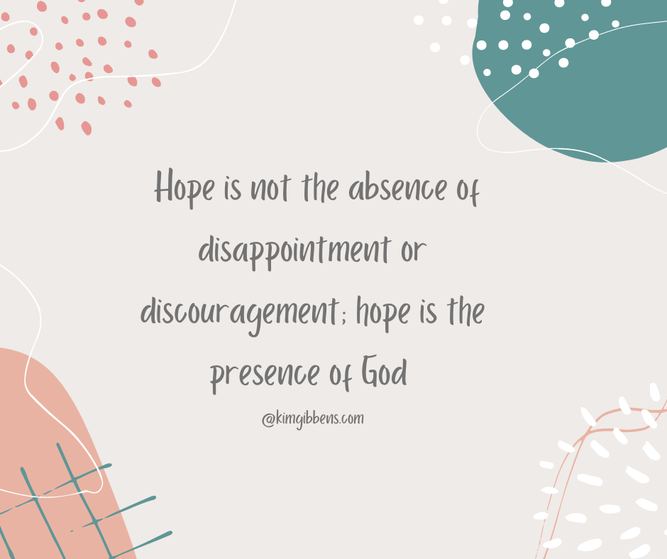 “For you, O Lord, are my hope, my trust, O Lord, from my youth” (Psalm 71:5) Eight years ago I stumbled across the One Word 365 movement. The concept behind it was to adopt one word to guide your year instead of making a list of ultimately unresolved resolutions. Since, I am not a big resolution person to begin with, adopting one word to ponder all year appealed to me. So, in 2014 I adopted the word “intentional” and thus began my journey with One Word 365. Since then I have spent 365 days focusing, relinquishing, following, and being mindful and reluctantly bold. I attempted thriving in 2019 (definitely didn’t turn out the way I thought it would), and last year was spent with hope. Hope wasn’t my first choice, but it was a “safe” choice. My heart had been circling around another word, but I wasn’t sure I could explain it. My first choice seemed odd compared to the standard words of faith, joy, and peace. So, I settled for my second choice, hope. I’ll be honest, I struggled with hope this year. I tried wearing it around my neck and wrapped about my wrist like a good luck charm. I clung to it like a life-raft in an ocean of discouragement. I rubbed it across my lips like a magic lantern breathing out wishes for change. I wanted so badly to feel hopeful, but I didn’t. Feelings of disillusionment, discouragement and disappointment marked my year more than hope. The truth was I had viewed hope as something to be felt. At the end of 2020 I wanted to feel better. I wanted my heart to be lighter. I wanted the anger inside of me to stop churning. I wanted to be able to trust people again; I wanted the disappointment to stop. I wanted to feel like singing in the rain, not crying in it. Ultimately, I wanted the sun to shine in my heart again. But, hope doesn’t work that way. This year taught me that hope is not a feeling or sense of euphoria. It doesn’t come or go based on my circumstances. It doesn’t hide behind the clouds only to appear when the sun shines. The truth about hope was in the verse I had posted as my cover photo at the beginning of 2021: “For you, O Lord, are my hope, my trust, O Lord, from my youth” (Psalm 71:5). The truth about hope was that hope is found in God. In fact, God is hope. You see, I had placed my trust in the word hope, in the idea of feeling hopeful. Basically, I wanted a magic wand to wave my struggles and tough feelings away. I wanted God to instantly make me feel better. Instead of seeking God himself, I was craving good feelings. A year with hope started to teach me that hope was not the absence of disappointment or discouragement; hope was the presence of God in the midst of all the struggles life had to give. Maybe now you’re wondering, what’s my word for 2022? Believe it or not, it was the word I considered for 2021, but set aside for hope. The word I came to for 2002 is behold, which means look or see. Two verses led me here: Behold, I am doing a new thing; now it springs forth, do you not perceive it? I will make a way in the wilderness and rivers in the desert. Isaiah 43:19 And Mary said, “Behold, I am the servant of the Lord; let it be to me according to your word.” And the angel departed from her. Luke 1:38. As I enter 2022, I want to look for what God is doing and I want be His ready servant. I want to “behold” the Lord this year. Maybe you are like me and want to experience God in a new way this year. I challenge you to consider asking God to lead you to a word to guide your thoughts and actions for the next 362 days. I know I have been blessed by the practice since 2014. “May the God of hope fill you with all joy and peace in believing, so that by the power of the Holy Spirit you may abound in hope” (Romans 15:13). For as high as the heavens are above the earth, so great is his steadfast love toward those who fear him; as far as the east is from the west, so far does he remove our transgressions from us. Psalm 103:11-12
God loves you. Maybe it doesn’t feel that way right now, but God loves you. How do I know this? Because the Bible tells me so. Are you humming a tune right now? The song learned long ago in childhood: “Jesus loves me this I know for the Bible tells me so” may sound trite and cliché, but it is Truth. This past year and a half have been a hard emotional time for me: betrayal, disappointment, hurt feelings, and stress have all weighed heavily on my heart and soul tipping me close to the edge of burnout. The emotional stuff I have been sorting through has become a heavy load for me to carry. The weight of it all has left me feeling overwhelmed. My prayers for relief and change seem to go unheard and unanswered. You may be carrying heavy stuff too. We could sit around comparing stuff; one-upping each other as to whose stuff was worse, like the scene in the movie Jaws where the men sit below deck comparing shark-encountered scars, but it really doesn’t matter. We all struggle. We all have things that make us ask: Why me? Where are you God? Do you still love me? My feelings about God’s love for me have wobbled over the last year and a half. My circumstances made it appear to me as if He had forgotten me. I felt overlooked, unseen. It was as if I wasn’t that important to Him anymore-- like He managed to find someone better. Even though I may have wobbled in my feelings about God’s love for me, the truth of His love never faltered. He loves me. Period. The steadfast love of the Lord is repeatedly stated in scripture leaving me with the choice to continue to wobble and worry about how God felt about me or to trust and take Him at His word. As far as the heavens are above the earth, so great is his steadfast love toward those who fear him. Psalm 103:11 Steadfast love of the Lord never ceases; his mercies never come to an end. Lamentations 3:22 The Lord will fulfill his purpose for me. Your steadfast love O Lord endures forever. Psalm 138:8 Feelings are fleeting when held up to the light of Truth. With this in mind, I am working on letting scripture stabilize my heart. I am leaning on the truth that God’s love is steadfast. No matter how I feel, God loves me. He gave Jesus for me and that alone should be enough to settle my heart issue of God’s love. The apostle Paul settled the issue of God’s love for him and came to this conclusion in Romans 8:38-39: For I am sure that neither death nor life, nor angels nor rulers, nor things present nor things to come, nor powers, nor height nor depth, nor anything else in all creation, will be able to separate us from the love of God in Christ Jesus our Lord. I don’t know what you are feeling right now. Maybe you feel betrayed. Let down. Abandoned. Alone. Hurt. Disappointed. Tired. Stressed. Worn out. You may be asking: Why me? Where are you God? Do you still love me? If questions of doubt are crashing around you, take a page from the playbook of Psalms and look up to the heavens. As the sky is above and all around, so is God’s love. He loves you more than you can ever know or imagine. David knew it. Paul knew. We can know it too. How? Because the Bible tells us so. |
AuthorBetween a husband, 2 sons, and teaching high school my sanity is found in running and Starbucks. I have a circle of running friends who inspire me to be authentic and real as I live a life of faith before them. Archives
April 2024
Categories |

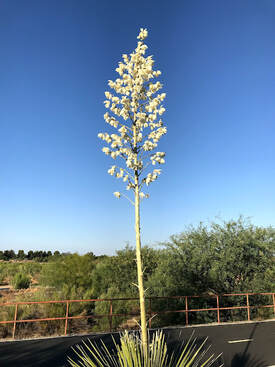
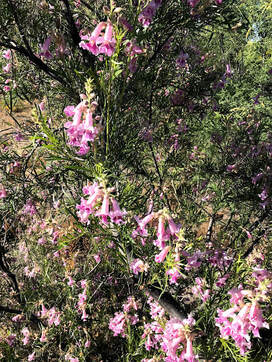
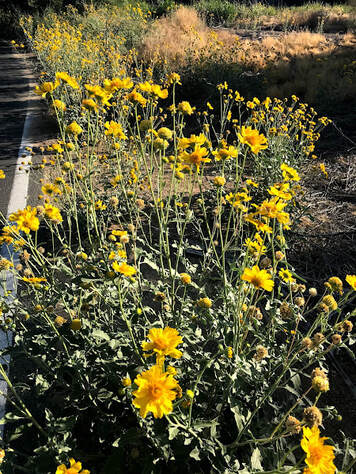
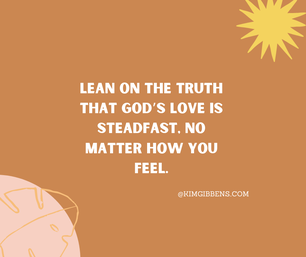
 RSS Feed
RSS Feed